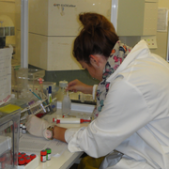
Greek researcher in breakthrough study that reveals new diagnosis for alzheimer’s
Scientists in the UK, headed by a Greek researcher, have developed an experimental non-invasive blood test for the early diagnosis of Alzheimer’s disease. In the largest and most conclusive study of its kind, researchers have analysed blood samples to create a novel and non-invasive way of helping to diagnose Alzheimer’s disease and distinguishing between different types of neurodegenerative disorders.
Following this breakthrough discovery, Alzheimer’s sufferers may now have an additional test to improve the accuracy of diagnosis in order to better tailor appropriate treatment. The research also offers a valuable opportunity to monitor the disease.
The study was led by Maria Paraskevaidi and professor Francis Martin. It was published in the prestigious journal Proceedings of the National Academy of Sciences USA, used sensor-based technology with a diamond core to analyse approximately 550 blood samples. By passing light through the diamond and observing its interactions with the blood plasma, researchers were able to identify specific chemical bonds within the blood. This biochemical data was then used to assess whether the samples were normal or contained any trace of a neurodegenerative disease, and if so, which kind.
The groundbreaking scientific investigation was carried out by researchers at the University of Central Lancashire (UCLan), in collaboration with the University of Manchester, Lancaster University and the Federal University of Rio Grande do Norte, Brazil.
Alzheimer’s diagnosis currently involves careful medical evaluation including a series of brain scans, physical examinations and memory testing, yet the only conclusive diagnosis is determined by post-mortem examination. This new blood test offers a non-invasive, more accurate and relatively cost-effective method of diagnosis, which will ensure the correct management of the condition.
Professor Francis Martin, principal investigator of the study and Biosciences theme lead at UCLan, said: “We have an aging population, meaning that the incidence and prevalence of Alzheimer’s is increasing, as is the need for accurate diagnosis. The ability to identify different neurodegenerative diseases through the analysis of blood offers a faster and accurate way of establishing the most effective treatment plan as well as disease monitoring.”
This new approach could also offer potential for carrying out tests to identify and monitor early signs of mild cognitive impairment, meaning that the onset of Alzheimer’s and other types of neurodegenerative diseases could be detected early and intervention measures could be put in place earlier to slow the progress of these diseases. This could be particularly beneficial in the sporting world, to assess footballers, rugby players and boxers post-injury, as well as the general public.
M. Paraskevaidis graduated from the Department of Chemistry of the University of Ioannina and holds a Ph.D. research at the University of Central Lancaster.









Οδυσσεας
-13/04/2018 9:50 pm
Αυτη η ερευνα δειχνει οχι το μυαλο αλλα τι σημαινει σκεψη-πραξη. Πολυ αξιολογη για ολους εμας που πασχουμε ή ειμαστε υποψηφιοι. Μπραβο στην επιστημονα και στην ομαδα της.